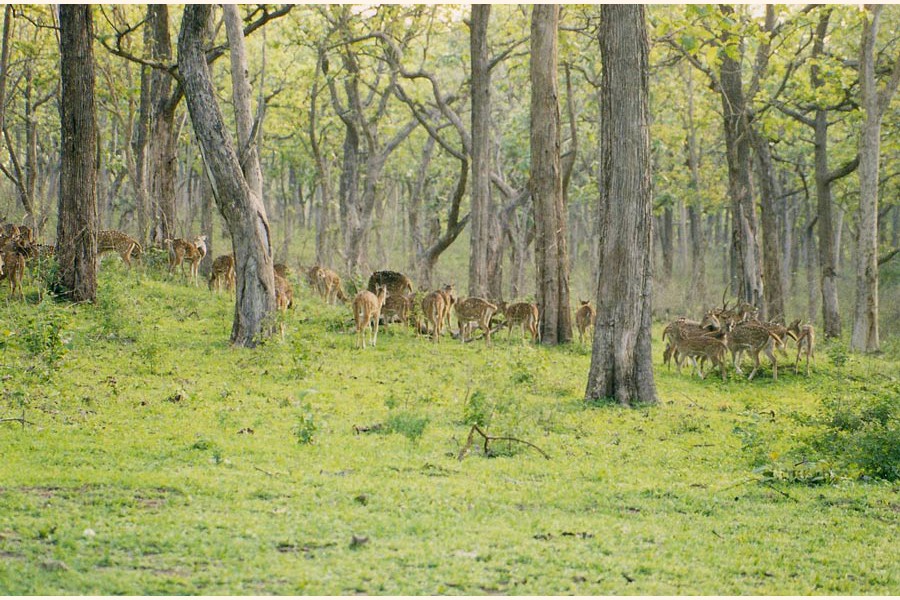Off to the Bandipur National Park. The earlier the better. Those who can avail the first foray into the jungle at 6.00 a.m are the luckiest. But we missed the prime opportunity of taking the first safari ride even though, we woke up at 5 O' clock in the morning and prepared for the 20 kilometres or so drive to the 474 sq kilometre safari park. There are different categories of safari expedition from exclusive family reservation of jeep to shared bus ride. Even such jungle safaris are of different durations of different rates. The olive-colour military pick-up-like vehicles cost most. We preferred the bus because of its greater height and seemingly better protection from wild animal attack, if any.
Later we came to realise that our apprehension of such an attack was misplaced. Why this was so can be clear from the peaceful encounter with the animals during the journey through the forest. The gaurs we came across first looked more like domesticated than wild. They are huge animals bigger than South Asian buffaloes but with smaller horns like those of cows. There was a flock of nine such gaurs, of which a few were grazing and others rested lazily ruminating. When our bus got nearer, they showed no sign of alarm nor even looked at the two tourist vehicles that stopped only at a distance of 20 metres from them. The reason is quite clear: they are used to such human interest in and enthusiasm about them. However, they were photo-friendly. Gave scant care to the repeated camera clicks from both vehicles! One wonders how they reacted if a selfie-crazy tourist went too close for comfort for a selfie snap!
By the way, deer were almost everywhere. And despite their beautiful sleek feature and invitingly lovely eyes, they did not attract much attention. Because they could be seen easily and in herds from one spot to another, their appeal to the eyes of tourists now looking for the sight of a larger or fiercer animal diminished. Fortunately for us we did not have to wait long for the presence of the pachyderm we were looking for. And lo, there was a mother elephant with her suckling baby. As the elephant was foraging through the trees and herbs, the baby tried to suckle milk. This was a feast for the eyes. But still not all seemed well though. The mother elephant did not look healthy enough. Its creased hide was mired with reddish soil and it looked thinner.
Next we came upon the most beautiful sight on the safari trip. It was a peacock in its regal beauty spreading its wings with the colourful imprints and strutting from side to side as if a model was posing for snaps by a cameraman from different angles. As the vehicle moved slowly through the teak, rosewood and sandalwood trees beside other trees and shrubs of the mainly deciduous forest, we were looking for its prime residential inhabitant -the tiger. But not a single one appeared in the clear morning sunlight. It was, needless to say, a great disappointment. Also the four-horn antelope was nowhere to be seen. There were more peacocks exhibiting their plumes at their glorious best but the first one had made such an impression that the later attractions paled before it. Moreover, they were little consolation or compensation for a sight of the majestic tiger.
Our timing of the visit to the tiger reserve was not right, perhaps. Tigers went into hiding. After all they are not like gaurs and elephants which could not care less for our intruding presence. But, it seems, tigers do. It would be a misstatement if we consider the expedition into the forest highly satisfying. In fact, the vehicles do not venture deep into the forest where the majestic animals are supposed to retire. After an hour or so, the vehicle took us to a road that runs through another part of the forest in Tamil Nadu to Ooty -one of the sought-after tourist attractions in South India. This busy road has certainly harmed the forest's quiet and peaceful ambience. It is contrary to eco-tourism. Our next destination is Ooty.


